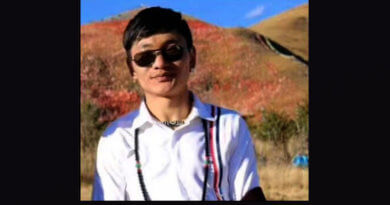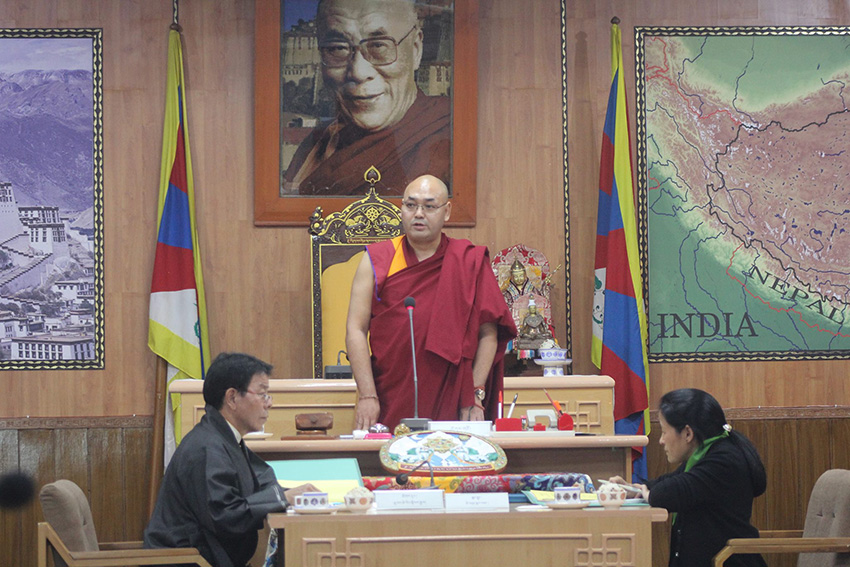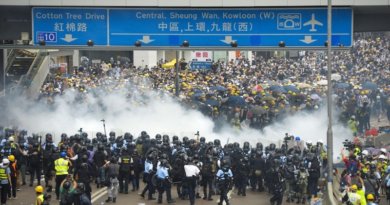Statement of Sikyong on the 57th Anniversary of Tibetan National Uprising Day
March 10, 2016
Today marks the fifty-seventh anniversary of the Tibetan people’s peaceful uprising of 1959 against People’s Republic of China’s invasion and occupation of Tibet. On this occasion, my colleagues in the Kashag and I would like to pay tribute and pray for all those brave men and women who laid down their lives for the just cause of Tibet. We express our solidarity with those who continue to suffer repression under Chinese rule.
Though decades have passed by with Tibet controlled by China, the Tibetan people have been able to maintain their identity and spirit despite living under difficult situation. New generations, inspired by the sacrifices made by their elders, have taken the responsibility to strive for the cause of Tibet. The courage and conviction of our compatriots inside Tibet deserves deep admiration.
Chinese government routinely claims there is happiness and prosperity with the development of a new Tibet. But the truth is otherwise. All the areas inhabited by the Tibetan people are bereft of basic freedoms and continues to remain under strict control and surveillance. This fact is clearly evident from the prevailing grid system imposed on the Tibetan people’s travel and movements. The Human Rights Watch reports extension of intensive surveillance program in the villages across Tibet. The recent self-immolation by two youths from within and outside Tibet in addition to 142 self-immolations in the past is further evidence of the lack of freedom in Tibet. The Kashag will endeavor to fulfill their aspirations and solely blame the repressive policies in Tibet as the cause of self-immolation.
I stand here to apprise you that the situation inside Tibet is grim. Anyone speaking up for religious freedom and environmental rights are often charged on political grounds and are given harsh punishments. Mere possession of the image of His Holiness the Dalai Lama leads to arrest and imprisonment. Repositories of Buddhist culture are tightly monitored, monks and nuns face expulsion for not denouncing their spiritual leader. The Freedom House Report 2016 has listed Tibet as the second least free place in the world after Syria. Similarly, the European Parliament in its Report on EU-China Relations, December 2015 has clearly expressed concern for lack of religious freedom and travel restrictions in Tibet. Thus the Tibetan people live in fear and insecurity.
The Chinese authorities continued treatment of national minorities, including Tibetan people, have sparked disaffection and alienation. The action of a Chinese owned and operated hotel in Rebkong (Ch: Tongren), Qinghai province drew strong opposition and protest when it banned employees from speaking Tibetan language. On 22nd Dec 2015, a senior communist party leader of Tibetan origin expressed concern at the prevalence of discrimination at a meeting during which he referred to the recurring instances where people with ethnic backgrounds were discriminated against or denied access to certain services. He said this problem has generated unwanted social impact and caused strong public reactions from ethnic regions. Similarly, the Chinese government’s policy in general and the remarks of few leaders in particular have dubbed a whole ethnic group as “splittist”. Such remarks have drawn sharp reactions within China from many scholars and intellectuals who have written hard-hitting responses.
Global environmentalists and scientists have taken cognizance of the importance of Tibetan plateau as it contains the third largest ice reserve and is the source of ten major rivers flowing downstream to several neighboring countries. However it must be reiterated that incessant mining of natural resources, deforestation, extensive damming of rivers, retreating glaciers, etc. have doubtless caused irreparable damage to Tibet’s environment, which in turn is affecting the environment of the Asian continent. Sensing the necessity of protecting Tibet’s environment, we have time and again consistently raised the issue at various international climate change conferences. Last year, Central Tibetan Administration presented facts and figures along with Ten Point Action document to the participants of COP21 held in Paris, arguing why Tibetan plateau matters to the world and clearly urging United Nations, Chinese government and international community to urgently initiate measures to protect it.
We the Kashag of the Central Tibetan Administration firmly believe that the longstanding issue of Tibet can be resolved through dialogue between the envoys of His Holiness the Dalai Lama and representatives of the Chinese government. We remain fully committed to the Middle Way Approach, which clearly seeks genuine autonomy for the Tibetan people within China. It is hoped the leaders in Beijing will see reason with the Middle Way Approach, instead of distorting it, and step forward to engage in dialogue with His Holiness the Dalai Lama’s envoys.
On this subject, US President Barrack Obama, holding a Joint Press Conference with President Xi Jinping at Rose Garden on September 25, 2015 said: “We continue to encourage Chinese authorities to preserve the religious and cultural identity of the Tibetan people, and to engage the Dalai Lama or his representatives.” The US government’s concern and support for the Tibetan people is demonstrated by the visits to Dharamshala in 2014 and 2016 by Ms Sarah Sewall, Special Coordinator for Tibet Issues and Under-Secretary for Civilian Security, Democracy and Human Rights of the Department of State. The Kashag deeply thank the US government for its support and solidarity as it provides hope and encouragement to the Tibetan people.
China claims the right to identify reincarnation of the Tibetan spiritual leader. This is a blatant lie as the claim is based on doctored history. The power and authority to decide the reincarnation of the Buddha of Compassion, Tibet’s protector and savior, manifested in the human form, rests solely with His Holiness the Dalai Lama. Nobody else has the right to do so. Regarding recognition of the reincarnation, His Holiness the Dalai Lama has given clear advice and direction in his statement issued on Sep 24, 2011 which reads as follows: “When I am about ninety I will consult the high Lamas of Tibetan Buddhist traditions, the Tibetan public, and other concerned people who follow Tibetan Buddhism, and re-evaluate whether the institution of the Dalai Lama should continue or not. On that basis we will take a decision. If it is decided that the reincarnation of the Dalai Lama should continue and there is a need for the Fifteenth Dalai Lama to be recognized, responsibility for doing so will primarily rest on the concerned officers of the Dalai Lama’s Gaden Phodrang Trust. They should consult the various heads of the Tibetan Buddhist traditions and the reliable oath-bound Dharma Protectors who are linked inseparably to the lineage of the Dalai Lamas. They should seek advice and direction from these concerned beings and carry out the procedures of search and recognition in accordance with past tradition. I shall leave clear instructions about this. Bear in mind that, apart from the reincarnation recognized through such legitimate methods, no recognition or acceptance should be given to a candidate chosen for political ends by anyone, including those in the PRC.”
We were greatly overjoyed to witness the deep respect, reverence and enthusiasm with which the Tibetan people inside and outside Tibet, friends and supporters world-wide celebrated the 80th birthday of His Holiness the Dalai Lama. The most recent mammoth Delhi event was attended by India’s former Prime Minister Dr. Manmohan Singh, former Deputy Prime Minister Shri L. K. Advani, former Ministers Dr. Karan Singh, Dr. P. Chidambaram and several other luminaries representing the people of India. At the time, Dr. Manmohan Singh reverentially referred to His Holiness the Dalai Lama as a gift of God to the world.
The infinite deeds or accomplishments of His Holiness the Great XIVth Dalai Lama are not stated here as these are known to the people worldwide. Yet, at a time when Buddhism is passing through a difficult period, the faithful followers and practicing Buddhists must feel grateful for the precious opportunity of receiving the 18 Great Stages of the Path (Lamrim) teachings imparted successfully by His Holiness the Dalai Lama for the past few years. Such a feat unheard of in the history of Tibet must be penned in golden letters. We are happy to share the good news that His Holiness will return to Dharamshala in the next few days after having successfully completed medical treatment in the United States.
After the devolution of political and administrative authority to the people’s elected leadership, the 14th Kashag headed by me is nearing completion of our tenure. Sincere effort has been made to create international awareness and support for Tibet, bring improvement in the education of Tibetan children and sustainability of Tibetan settlements, among others. Awarding Tibetan Buddhist nuns Geshema Degree is a historic decision. An overwhelming response was witnessed to our call for helping earthquake affected people in Nepal which deserves appreciation and acknowledgement. The Kashag would like to deeply thank and express our gratitude to His Holiness the Dalai Lama for continuously showering us with his invaluable words of wisdom and kind advices. We must wholeheartedly thank the Tibetan people inside and outside Tibet for supporting us in so many ways.
The Tibetan people in exile are following the great path of democracy and have thus far taken keen interest and active participation in the election processes. Very soon the final round for election of Sikyong and Members of Tibetan Parliament-in-Exile will be held. Therefore, the Tibetan electorate is encouraged to participate on the election day in order to exercise the democratic rights as specified in the Charter for Tibetans in Exile.
The Kashag would like to take this opportunity to remember the kindness of the leaders of various nations that cherish justice, parliamentarians, intellectuals, scholars, human rights organizations and Tibet Support Groups, who have been steadfast in their support for the Tibetan people. In particular, we will always remember the kindness and consistent support of the people and government of India and state governments for generously helping us preserve and promote our religion and culture and ensuring the welfare of the Tibetan people in exile. We offer our heartfelt gratitude to all of them.
Finally, we sincerely pray for a healthy and long life of our most esteemed leader His Holiness the Great XIVth Dalai Lama. May all his wishes be fulfilled. May there be immediate resolution to the issue of Tibet. Above all, may the day for the union of Tibetans inside and outside Tibet emerge swiftly.
SIKYONG
Central Tibetan Administration
March 10, 2016
(tibet.net)



